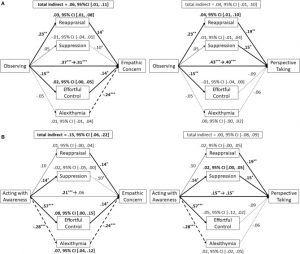Improve Empathy with Attention-Related Facets of Mindfulness
By John M. de Castro, Ph.D.
“mindfulness increases empathy and compassion for others and for oneself.” – Shauna Shapiro
Humans are social animals. This is a great asset for the species as the effort of the individual is amplified by cooperation. In primitive times, this cooperation was essential for survival. But in modern times it is also essential, not for survival but rather for making a living and for the happiness of the individual. This ability to cooperate is so essential to human flourishing that it is built deep into our DNA and is reflected in the structure of the human nervous system. Empathy and compassion are essential for appropriate social engagement and cooperation.
Mindfulness has been found to increase prosocial emotions such as compassion, and empathy and prosocial behaviors such as altruism. It is not clear, however, exactly how mindfulness training improves empathy. Empathy involves the ability to understand and share the feelings of others. Thus, the basic attentional processes involved in mindfulness (observing and acting with awareness) could be key in the development of empathy.
In today’s Research News article “Exploring the Multidimensional Links Between Trait Mindfulness and Trait Empathy. Frontiers in psychiatry.” (See summary below or view the full text of the study at: https://www.ncbi.nlm.nih.gov/pmc/articles/PMC8371256/ ) Himichi and colleagues recruited healthy adults and had them complete measures of mindfulness, personal distress, fantasy, empathetic concern, and perspective taking. They found that the higher the level of the observing and acting with awareness facets of mindfulness the higher the level of empathetic concern and perspective taking.
In a second study a different sample of healthy adults were recruited, and they completed measures of mindfulness, emotion regulation, effortful control, and alexithymia. They again found that the higher the level of the observing and acting with awareness facets of mindfulness the higher the level of empathetic concern and perspective taking. But they also found that these facets of mindfulness affected the components of empathy both directly and indirectly by the mindfulness facets affecting reappraisal that in turn affected empathy.
The results are correlational and as such causation cannot be determined. But previous controlled research by others has found that mindfulness training increases empathy and reappraisal. So, the relationships observed in the present studies likely result from mindfulness causing an increase in empathy and reappraisal. The observing and acting with awareness facets of mindfulness require heightened attention and this attention to the present moment may make it easier to comprehend the situation with others increasing empathy. Reappraisal is a cognitive strategy used in emotion regulation. Reappraisal involves reexamining and reframing interpretations of events. Increasing reappraisal appears to also increase empathy perhaps by allowing for a mindful examination of the situations affecting others.
Regardless, it is clear that the attentional facets of mindfulness are related to empathy. This may explain why mindfulness improves social behavior and relationships. It may act by making the individual better able to pay attention to and examine what is going on with others and this understanding would promote better interactions.
So, improve empathy with attention-related facets of mindfulness.
“mindfulness’s most profound benefit may not be the one that’s most often touted—adapting to a stressful, competitive, even unkind 24/7 world. Instead, meditation might fundamentally alter how we treat those around us.” – David DeSteno
CMCS – Center for Mindfulness and Contemplative Studies
This and other Contemplative Studies posts are available on Twitter @MindfulResearch
Study Summary
Himichi, T., Osanai, H., Goto, T., Fujita, H., Kawamura, Y., Smith, A., & Nomura, M. (2021). Exploring the Multidimensional Links Between Trait Mindfulness and Trait Empathy. Frontiers in psychiatry, 12, 498614. https://doi.org/10.3389/fpsyt.2021.498614
Abstract
Empathy and mindfulness are currently major topics of scientific interest. Although it is well-known that mindfulness—typically as an outcome related to meditation—generates empathy at the state level, only a small number of studies have documented the trait (i.e., personality) level association between mindfulness and empathy. Furthermore, the underlying mechanisms (subcomponents and mediator variables) that support this association remain unclear. Thus, here, with a focus on the trait level, we investigated relationships among multiple subcomponents of trait mindfulness and trait empathy (Study 1). Next, we reexamined the aforementioned relationships in an independent sample, with the further aim of investigating relevant mediation factors (Study 2). We found that two attention-related components of trait mindfulness—observing and acting with awareness—reliably and positively related to both affective and cognitive dimensions of trait empathy (i.e., empathic concern and perspective taking). Furthermore, we found that effortful control, reappraisal, and trait alexithymia mediated relationships between the aforementioned attention-related components of trait mindfulness and empathic concern. Taken together, our results suggest that the links between mindfulness and empathy are multidimensional and complex. These findings may ultimately contribute to an understanding of the mechanisms underlying the positive effects of meditation on empathy.
https://www.ncbi.nlm.nih.gov/pmc/articles/PMC8371256/
